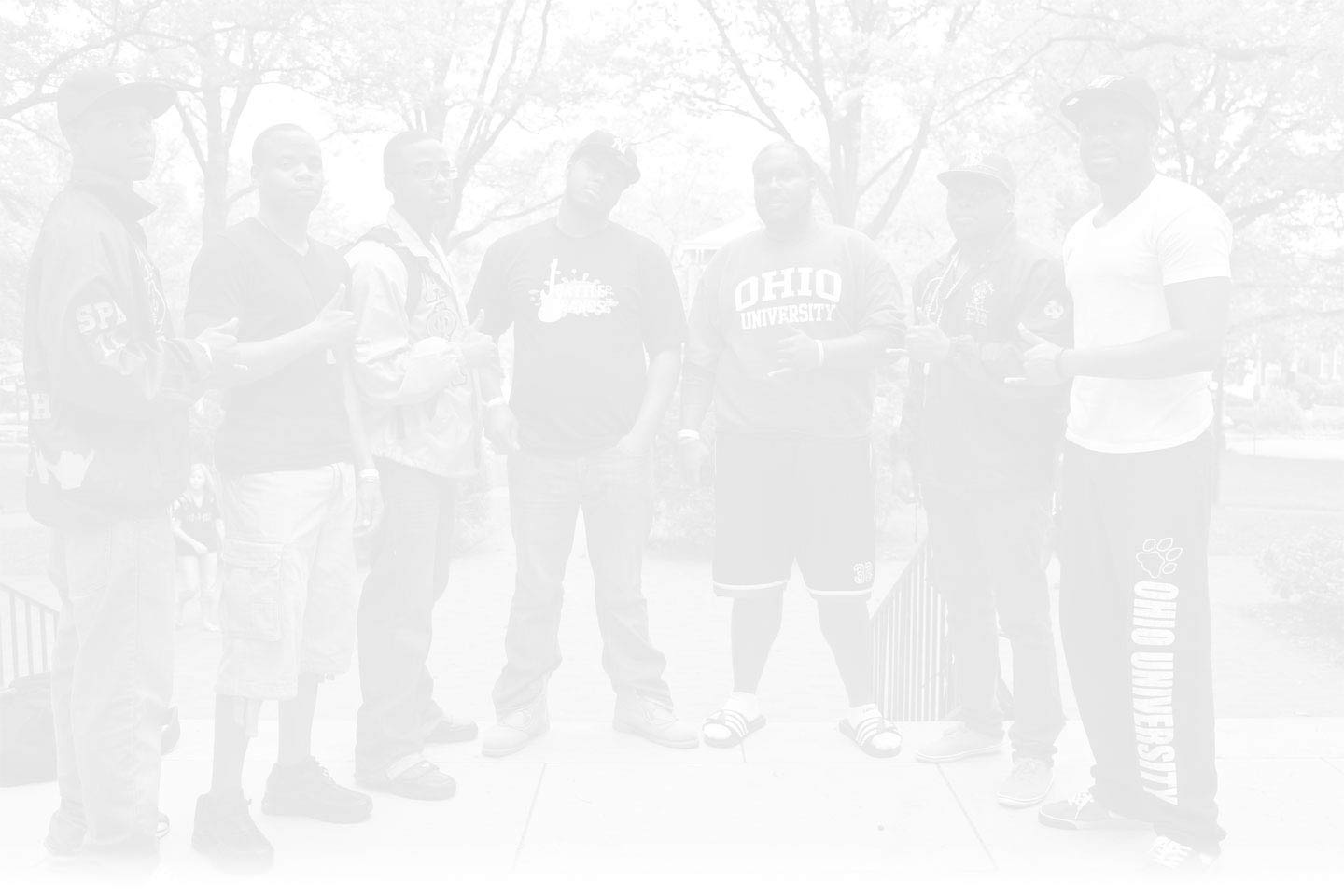All Black
Eleven guys challenge most people's definition of young black men.
It is a rainy Saturday night, around midnight, in downtown Athens. The bars on Court Street are almost empty; unusual for a Saturday night, when crowds of students walk up and down the street searching for the next bar. Most students have finished partying for the night. The first street festival of spring, High Fest, was held earlier in the day. The evening rain scattered away the usual party people.
A bar door opens, spilling loud hip-hop music and flavored smoke into the street. A six-foot one African American student wearing a Cincinnati Reds hat sits at the door and collects a $3 entry fee, which he puts into a box with the initials APA. His name is Gregory Richards, one of the 11 members of the smallest black fraternity at Ohio University: Alpha Phi Alpha. Tonight he is stuck working the door, because the fraternity is throwing a party at the hookah bar.
"We are the only fraternity that made the grades and is allowed to have parties and we thought why not also make some money," said Harvey Smith, the president of the Alpha Phi Alpha Fraternity.
The front room of the bar is split in two by an imaginary line. On one side, white kids sit smoking hookah pipes. On the other side, black people come and go, in and out. The quiet divide goes unnoticed, and the two groups barely interact. The back room is different. On chairs all around the room, young black girls and guys move their heads in rhythm. The D.J. is just warming up and he cranks the volume on the sound system. Through the speakers commercial hip-hop music fills the room. It seems far away from a small town in the middle of Appalachia — more like a club in a big city.
"We interact with the white community more than they interact with us mostly because we don't have much of a choice. We wanna go to the bars, they are going to be at the bars. We wanna go to the movie theater, they are going to be at the movie theater. We wanna go to a program hosted through the campus, they are going to be there, but when we have programs they tend to not come to our programs," says Donald Lindsay, member of APA.
One time a couple of guys yelled out of a car, 'WE don't want YOU here,' but I know I'm supposed to be here because if I wasn't supposed to be here I would have been gone long time ago.—Harvey Smith
The African-American community at Ohio University makes up only 6% of the population, at a school of 21,000 students.
"It was kind of like a cultural shock at first. I came from a 100% black high school, so transitioning to OU was a little different. We came for a visit like they bring you down here and you go to the programs with all other minority students. You see a lot of minorities, but when classes start you look around and that crowd of 200 people that felt like a lot is 200 among 20.000…so it's interesting," said Lindsay.
The brothers of Alpha Phi Alpha (APA) say that they enjoy going to Ohio University and for the most part they do not have bad encounters with other students. "One time a couple of guys yelled out of a car: 'WE don't want YOU here,' but I know I'm supposed to be here because if I wasn't supposed to be here I would have been gone long time ago," Smith said.
Most of the brothers of the fraternity are on academic scholarships. The Urban Scholarship is what brought Donald Lindsay to Ohio University; through the scholarship he also met his girlfriend, Victoria. They have been together for two years now.
"In my immediate family I'm the first person to actually go to college and stay and I know the impact that college can have on a person … I choose to come to college to open a career path for myself but also to help my family and to be a role model for my siblings like my little brother," said Lindsay.
The guys joined the fraternity for different reasons. Harvey Smith's father was also a member of APA and he grew up watching the members of the fraternity doing community service projects. Donald Lindsay received help from the members of APA after his father passed away; they also sent him money when he needed it the most." APA, it's all about uplifting the community and making sure we stay to our aims which are mainly deeds, scholarships and love for mankind."
This year the fraternity has 11 members, but in past years, there have been as few as one. "A lot of people shied away because they think only African-Americans can join, but actually we do have Caucasian members," at other schools, said Smith.
There are no white people at their fraternity parties. "I know it seems that the black fraternity doesn't want to be involved with the white community but it's quite the contrary, a lot of them have probably more white friends than they have black friends really because the campus in general is white anyway," Terence Robertson, one of the new members of the fraternity, said.
As ordinary students at Ohio University the guys try to get involved in all sorts of activities and events, from fundraising and community service, to street fests — though they are not always well received.
It is Palmer Fest weekend and a small group of black students walk up to the party. It starts to rain and they seek refuge on one of the porches filled with white students; the group looks like a spot of color in an ocean of white. They make their way into the house, but soon come back out. From inside a white guy, with the spark of alcohol in his eyes confronts them, yelling, "WHO do you know here?"
They try to explain that they know someone at the party, that they were invited, but the guy does not care. He continues to yell, "I don't care get out of my porch, I live here, I pay for this house, LEAVE NOW!" The small group leaves the porch. They stand awkwardly on the lawn in the falling rain.
"This is what I was talking about. I feel that 'who do you know here' question is irrelevant because I just watched ten people walk into the party and [they] didn't ask them anything," says Lindsay.
The 11 members of Alpha Phi Alpha challenge many peoples' definitions of young black men. Terence Robertson points out that yes, they do rap, but they also play guitar and piano. Yes, they have wild parties, but they also go to classes and keep their grades up. Yes, they do like fried chicken and watermelon, but who doesn't? Yes, they do like white women, but they are not discriminating, "we like any woman that is attractive and has an interesting personality."




